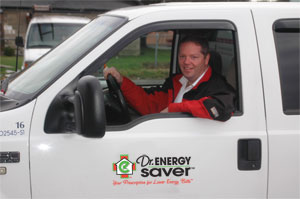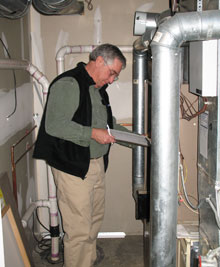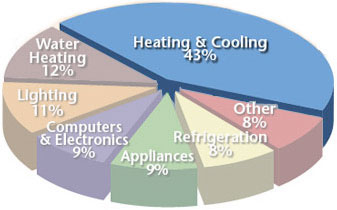In Business Since | License #
In Business Since | License #


Your HVAC Contractor should perform a Home Energy Audit to determine what size and type of HVAC system your home needs.
Sooner or later, you'll need to find a contractor to work on your HVAC system. HVAC stands for heating, ventilation and air conditioning, and encompasses the most expensive and extensive combination of equipment in your house.
We're talking about furnaces, boilers, condensers, fans, ductwork, flues, dampers and registers, just for starters. These are the components you depend on to keep you comfortable inside when it's not comfortable outside.
Every community has its share of HVAC contractors, so you'll never have to worry about finding one. But you should worry about finding the right contractor, and about the numerous factors that affect the safety, efficiency and longevity of your HVAC system.
Dr. Energy Saver is an easy choice - we have the knowledge and experience necessary to install quality HVAC systems. Contact us today for a home energy audit!

An HVAC specialist can diagnose and
properly size your HVAC system.
Back when fossil fuels were cheap and environmental concerns were minimal, replacing a furnace, boiler or AC unit was pretty straightforward. The HVAC contractor disconnected the old equipment and put a new unit in its place.
It was customary for the contractor to specify oversize equipment, since this added "fudge factor" ensured adequate heating and cooling capacity. Over time, contractors have learned that this approach doesn’t make much sense. "Ballparking" and oversizing HVAC equipment will result in wasted energy and utility bills that are much higher than necessary.
When you consider that heating and cooling can account for 50% or more of your total energy expenses, you can't afford to go with an HVAC contractor who doesn't know his stuff.
If you need new heating and/or cooling equipment, it's smart to have an energy audit done on your house before the new equipment is selected and sized. There are a number of reasons for this. A thorough home energy audit will identify numerous factors that affect the performance of your HVAC system. For example:

Heating and Cooling accounts for more than 40% of
your home energy usage.
Well, if the contractor you're talking with doesn't see any value in a home energy audit, it's worth looking for a different contractor. What you'll learn from Dr. Energy Saver is that by completing a thorough energy checkup (aka energy audit) and then making selected improvements (especially in the areas mentioned above), you'll be able to save big on HVAC costs, which comprise more than 40% of your home energy usage and savings.
And that savings comes in two forms:
Your local Dr. Energy Saver team can perform the energy audit, make all the recommended energy-saving improvements, and then complete the job by replacing outdated, energy-wasting HVAC components with right-sized, super-efficient equipment.
Looking for a price? Get a no cost, no obligation free estimate.